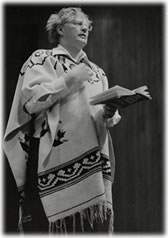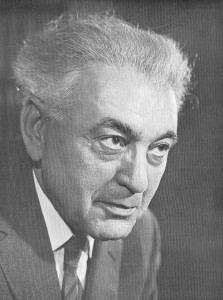Category — Coming of Age
GREAT BOOKS AND
SOME GREAT PROFS
Paul Ilie, a Great Books professor at Michigan called his students “Mr.” and “Ms.” For example, “Mr. Stratton.” Eighteen-year-old me — Mr. Stratton? Ilie taught The Iliad, Thucydides, Plato, and Sophocles. Glad I read those books.

Paul Ilie
I begged my Inorganic Chem prof for a B. I needed the B for my pre-med transcript. I did C work throughout the semester but got an A on the final. Paul Rasmussen wouldn’t deal; the numbers didn’t add up. Attention, Bert, adulthood ahead.
I asked my Calculus professor, “What is the meaning of all this?” Wilfred Kaplan didn’t blanch. He said he wasn’t sure.
I got a D in Organic Chemistry and switched to English.
Benjamin Franklin V taught Hawthorne, Melville and Twain. I visited Franklin’s house a couple times to listen to jazz records. He had a thing for Babs Gonzales, a hipster vocalese bopper. Franklin was an Ohio State grad from Gallipolis and was related to Ben Franklin. Franklin-the-prof was 11 years older than me and had caught some of the beatnik era.
Another young prof was Bernard Q. Nietschmann. He taught a gut course — Human Geography. He gave me four credit hours for writing a novel. Nietschmann’s main focus was the Miskito Indians of Nicaragua. He once tore up a $20 bill in class to show his disdain for materialistic mainstream culture. The class went nuts, several students screaming at the prof to hand over the money. (Twenty dollars in 1970 equals $160 now.)
Donald Hall held a poetry-writing workshop at his house on South University Avenue. (Workshops weren’t common at Michigan. Lectures were, like 200 kids in a room.) At the workshop we critiqued each other’s work. Hall owned one LP record: Sgt. Pepper’s. Never a music guy – Hall.
Ted Berrigan, an East Village poet, was at Michigan one semester as a visiting professor. Hall got Berrigan the job. Berrigan had interviewed Jack Kerouac for the Paris Review. Berrigan had fans. I was a super-fan.

English 231, Fall 1969
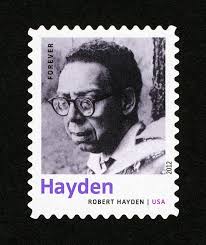 Robert Hayden, another English professor, wound up on a U.S. postage stamp. At his office, I showed him my latest poems but he didn’t cotton to jokey, light fare. He was polite, though. He dressed properly, just like my Great Books prof. Profs dressed either like profs or hippies. There was no in-between.
Robert Hayden, another English professor, wound up on a U.S. postage stamp. At his office, I showed him my latest poems but he didn’t cotton to jokey, light fare. He was polite, though. He dressed properly, just like my Great Books prof. Profs dressed either like profs or hippies. There was no in-between.
August 14, 2024 3 Comments
THE MUSICAL INFLUENCES
IN MY LIFE
From the Cleveland Plain Dealer (7/24/24) . . .
The musical influences in my life
by Bert Stratton
CLEVELAND HEIGHTS, Ohio — I played music with a prodigy. I didn’t know he was a prodigy. He and I were in junior high. He played piano. I played clarinet. I just googled him — William Goldenberg. He wound up at Oberlin College, Julliard, and then Indiana University. He became a professor of piano at a university. I didn’t know him that well; he was the son of a friend of my parents.
I wasn’t in the prodigy’s league. Not even close. But I did practice a lot. I enjoyed the “typing” aspect of clarinet — learning where to place my fingers on the instrument. I blame my parents and my clarinet teacher for much of my musical shortcomings. Leonard Bernstein was not on the TV at our home. There was no “Peter and the Wolf” by Prokofiev. Harry Golub, my clarinet teacher, was an alumnus of the Ohio State University concert band and owned a music store in South Euclid. He sold guitars, bongos and band instruments.
I entered The Contest every year in junior high. The Contest — as we kids called it — was a music-recital competition sponsored by the state music-educators’ association. Young musicians would play their repertoire in front of teacher-judges, who would give us ratings of I, II or III.
I often got III — the worst. I would get nervous and lose my place in the sheet music. Worse, I didn’t know how the piece was supposed to sound because I had never heard a professional recording of it. I especially remember a train wreck on Mozart’s “Divertimento in D Major, Minuetto,” at a contest held at Moody Junior High School in Bedford around 1963. I lost my place several times and had to start over from the beginning. My prodigy accompanist was of no help.
Classical musicians tell you, “I studied with Joe So-and-So, who studied with Marie So-and-So, who studied with Maestro So-and-So.” It’s biblical – the lineage obsession in classical music.

Philip Setzer
My pianist developed a long, impressive bio over the years, but not as long as another guy — from my Little League — who intimidated me even more. He was Philip Setzer, a violinist I went to grade school with. At holiday school concerts at Victory Park School in South Euclid, I’d botch “The Theme from Exodus,” and Setzer would ace-play a Brahms sonata. Phil was a founder of the world-renowned Emerson String Quartet, which, until its members’ recent retirement, was like the New York Yankees of string quartets. Setzer’s mother and father were violinists in the Cleveland Orchestra; he attended many Cleveland Orchestra concerts as a kid. That helped.
In the early 1990s, I played a benefit concert with two Cleveland Orchestra musicians. It was a fundraiser for a Jewish day school. The orchestra musicians asked me whom I had studied with. I said, “Nobody.”
Mr. Nobody: Harry Golub. His store was on Warrensville Center Road at East Antisdale Road. The structure now houses South Euclid Hardware. The building — in the 1960s — also featured a hair salon and a kosher butcher shop, run by Mr. Golub’s father.
Harry Golub often ate Hebrew National salami sandwiches during my lessons. That stunk. He was into real estate. He built a four-suite apartment building across the street from the music store. So he owned two buildings: the music building and the apartment building. He named the apartment building after his daughter, Joyce. Mr. Golub, by his example, taught me about real estate and very little about music. Maybe that’s why my parents sent me there for lessons.
Bert Stratton, a frequent contributor, lives in Cleveland Heights and has also written for The Wall Street Journal and New York Times. He writes the blog “Klezmer Guy: Real Music & Real Estate.”
August 6, 2024 5 Comments
A WRITER’S GUIDE (1974)
I’m back in Cleveland. I’m thinking about Boston and New York. I know you are, too.
Here’s the title of my next book: Horseman Jake Rides the Syrup.
Nostalgia is a drag. Jack Kerouac is an inspiration. How about reading My Friend Henry Miller by Alfred Perles?
The dinosaur was the most successful specie that ever lived.
I left my heart in Sandusky.
My friend Chap owns a Corvette. He rendezvoused with 11 other Corvette owners at Eastgate. He’s got a 350 hp with headers, minus emission controls.
I saw Sleeper. I resented the nebbish-Jewish stereotypes.
Dad: “If you get a car, what are you going to do to support it?” Me: “I’ll get some money somewhere. I’ll rob a bank.” Dad: “You do that and I’ll wipe my hands of you — finished!”
Anybody who talks Lit in this town is talking $.
Stan Smith vs. John Newcombe.
Nelson Algren’s tough-guy first-person stories are obnoxious. Bukowski can pull it off because he really is a fuck-up.
To Martha Winston at the Curtis Brown Agency: “This is my latest novel. I’d appreciate it if you’d take a look at it. The book is mostly about a junior-high-school boy. I haven’t sent this manuscript to anybody else.”
Terry Southern, Erje Ayden, Buk, Dreiser and McMurtry ought to form a horny men’s club. I’d join.
Never write about a place you haven’t done time in — at least a year.
Here’s a simile. Not sure where it’s from: He looked like a chalkboard eraser floating in a pool of beer.
High school is something I’m trying to forget — not remember!
I dig Bob Newhart because his humor is so low-key, and he’s so shy. Richard Price said, “I used to think writing was like being a stand-up comedian.”
Anthony Burgess doesn’t crack a joke in the first 60 pages of his novel M/F.
Detail for detail’s sake is useless.
My dad said I should apologize to my friend Dennis for calling him a “swine” on the phone.
Horse sit.
Anwar Sadat. Answer Sadat.
Erza, from the Bible, lived in Babylonia.
I’m buying my dad’s Plymouth Valiant, and he’s buying a new Dodge Dart Swinger. I’ll need plates, a title, and insurance.
Dad says, “You don’t know what rough times are.” He knows. His mother wouldn’t allow him to go out for track in high school because he had to work in the store after school.
Authors have two jobs: writing stuff and learning stuff. You need to know something. What do I know?
Music is easier than Lit. In music — at least instrumental music — you can play scales all day if you’re uninspired. In Lit you can pick your nose and flip out.
Zawinul. Hank Crawford. Adderley. The Nude Wave is on Impulse.

Bert Stratton, U-M Hopwood photo, 1974.
Characters in novels go to Chapel Hill (Thomas Wolfe), Harvard (Wolfe again), U. of Chicago (Roth), or Columbia (Kerouac). Where is the great A2 novel?
Blue and maize will make a purple Hayes.
Tickle University, Philadelphia, Pa.
This Book Closes at 10 pm.
The Bar Mitzvah Goer by Walker Pearl.
Never again — Meir Kahane.
I’m thinking of getting married. To whom? You!
The Time-Life building is right here. I’m living in it — the Mark IV apartments, Beachwood, Ohio. (So are my parents.)
July 3, 2024 4 Comments
ON THE SCENE (1975)
I auditioned for a soul band at East 91 Street and Union Avenue. I had on red Adidas tennis shoes. The bandleader, Amos, liked the colors: the red shoes and my white skin. He said, “Ain’t no Holiday Inn going to hire no band without a white guy, and right now there ain’t nary a grain of salt in this room.”
I wasn’t too good on sax but I could play harmonica. Amos was intrigued by the harp; he considered the harmonica “country” — not a respectable axe for a black man but OK for a white guy. He said, “We can use that harp. You hip to Tower of Power? They got a bad white dude on harp. You hip to War? Another bad brother of yours on harp.”
The keyboard player had doubts, not about me so much, but about pot. He was exasperated by Amos’ marijuana smoking. The keyboard guy had qualms about playing in bars where customers might be high on marijuana. “Weed is communicating with the demon,” he said.
Amos said, “What you think? What you going to do when we play cabarets and shit? It ain’t no motherfucking church!”
“I quit,” the keyboardist said.
Things fell apart. Amos’ young son sat in on drums the next rehearsal, and then we had a mediocre female drummer. A horn player – an old guy (about 40) – had no teeth. He said, “Man, I can’t play without my choppers.”
Amos said we should move in a different direction: “gutbucket blues” or “even country western.” (I didn’t bring up klezmer because I hadn’t heard of it in 1975.) Amos said, “I’m unemployed! I’ll try anything.”
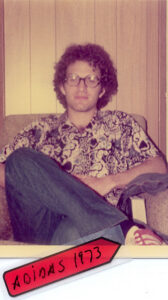 One night I stopped by the Hibachi Lounge at Union Avenue and East 103 Street. That venue was supposed to be our first gig. The Hibachi bouncer, wearing a red jumpsuit and red wide-brim hat, hung out at the pay phone, talking and shuckling (davening) like he was listening to Dial-A-Jewish-Concept. Several women line-danced to disco music from the jukebox. A couple women stared at me. Was it my red tennis shoes?
One night I stopped by the Hibachi Lounge at Union Avenue and East 103 Street. That venue was supposed to be our first gig. The Hibachi bouncer, wearing a red jumpsuit and red wide-brim hat, hung out at the pay phone, talking and shuckling (davening) like he was listening to Dial-A-Jewish-Concept. Several women line-danced to disco music from the jukebox. A couple women stared at me. Was it my red tennis shoes?
We never did play a gig.
March 13, 2024 1 Comment
HERBERT GOLD
OF HATHAWAY AVENUE
I wanted to be Herbert Gold, who wrote for Playboy and other mags. He also wrote novels about growing up in Cleveland. They weren’t good novels. They were too wordy, going in circles. He couldn’t do plot. (Not too many people can.)
Gold was one of a handful of Jews who grew up in Lakewood in the 1920s and 1930s. He lived on Hathaway Avenue. He died on Nov. 19 at 99 in San Francisco. His father ran a small grocery store in Lakewood, and the father — unlike most Cleveland Jews — didn’t settle on the East Side. (Lakewood, on Cleveland’s West Side, was beyond the pale for Jews back then, and still is to some extent.)
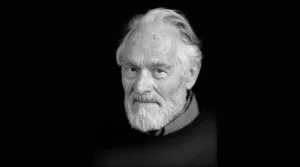
Herbert Gold. circa 2010.
I passed Gold’s house on Hathaway Avenue in the 1970s on my way to managing apartments in Lakewood. I had unpublished novels; I had a lit agent in New York. I wanted to be the “next Herbert Gold,” though slightly better. Instead, I became the “first Bert Stratton.”
The Prospect Before Us was Gold’s novel about managing a rundown hotel on Prospect Avenue in Cleveland. You’d think a book with such a good title would be good, but it never went anywhere. It wasn’t funny or tragic. Don Robertson, another local novelist, was better. Robertson could be funny, for one thing.
Gold’s memoir My Last Two Thousand Years — about his father and Herb’s relationship to Jewishness — was moving. He wrote, “My father came to America from Russia and lived in a basement on the Lower East Side. I came to America from Lakewood to live in a basement on the Lower East Side. I washed dishes, cleaned rooms, waited on tables and tried to learn a little Yiddish [1942, NYC].”
Gold moved to San Francisco in 1960 and stayed there. He visited Haiti often. I occasionally saw his brother Sid on Coventry Road in Cleveland Heights. Sid was a Coventry cowboy — a regular in Harvey Pekar’s comic books. Sid didn’t have a job and played a lot of chess.
In a 2021 interview, Gold said, “I’m very preoccupied with the fact that I’m not going to live forever. Death is inevitable and I have to accept it. I’m comforted by the fact that a few people, my children, will remember me or will inherit something from me, and I will be immortal in that sense.”
Herb Gold: a Jewish writer from Lakewood, Ohio. I gotta drive by his childhood house at 1229 Hathaway Avenue again.
—
I had an op-ed in the Wall Street Journal on Nov. 16. “My Gaza Friend is Dead.” [No paywall]
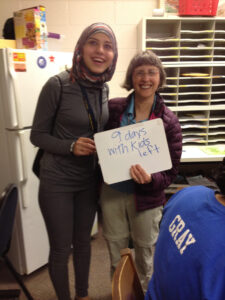
Baraa Abu Elaish (L) and Alice Stratton. Fairfax Elementary School, Cleveland Heights, Ohio. 2014.
—
On a lighter subject, here’s my essay in today’s Cleveland Plain Dealer. “Pondering signs, borders and license plates.”
—
Yiddishe Cup plays a free concert 2-3 pm this Sun. (Dec. 3) at the Beachwood Community Center, 25225 Fairmount Blvd, Beachwood, Ohio. Be there!
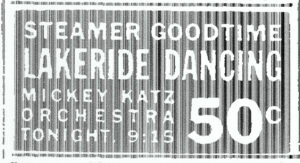
Plain Dealer ad, 6/24/36
November 29, 2023 3 Comments
“SPOKEN WORD” SPOKE TO ME
Myers, an independent-living facility in Beachwood, Ohio, had a front awning that read Myers Apartments. Why the word Apartments? Myers was eight stories and was an apartment building. It didn’t look like a swimming pool. I had a bad attitude going into Myers. I was determined not to play my usual Yiddish music standards, like “Bay Mir Bistu Sheyn” and “Tumbalaika.” Instead, I would read blog entries about real estate. My pianist, Alan Douglass, would follow up by singing “Dear Landlord” by Bob Dylan.
One Myers resident, seated in the front row, got up to leave halfway through the show. I suggested she stick around for “Gentile on My Mind” — a Yiddishe Cup tune — but she left. Alan and I went into “Because of You,” a Tony Bennett classic. That placated some people, but not her. And then I read more bloggie stuff. My wife, Alice, followed with some “oy-robics” — Jewish chair exercises. (“Turn your neck to the right. Kvetch to your neighbor.” That sort of thing.)
Afterward, Alice and I went to a Chinese restaurant to recap the show. We went to Ho Wah, where my mother and I had often dined. If my mother were still alive, she would not have liked the Myers show. Alice said, “Easy on the prose and Bob Dylan next time.”
I didn’t listen to Alice. I followed up with a similar program at the Maltz Museum of Jewish Heritage, where I melded real estate prose and klezmer. After the Schmaltz gig, I ran into poet Barry Zucker at Whole Foods. He was passing out ban-pesticides literature. Barry told me he often recited poetry to music at open readings. I thought the poetry-and-jazz combination had died out sixty years ago. (By the way, Barry looked like Allen Ginsberg.)
Dig this . . . Readings on the Beat Generation by Jack Kerouac, with Steve Allen on piano, produced by Bill Randle. That record hit me hard in college. Bill Randle — the Kerouac producer — had been a Cleveland DJ who moved to New York. [No, he traveled to NYC on weekends.] Randle used to play Yiddish Cup’s version of “Bay Mir Bistu Sheyn” on his Cleveland radio show in the 1990s. I was a fan of Randle mostly because of the Kerouac record. I even knew Randle’s favorite pants were Levi’s corduroys. (He mentioned that in a newspaper column he wrote.) Randle helped discover Elvis. Randle knew everybody. On his radio show, he would name-drop like crazy. Very big on Johnny Ray.
I borrowed the Readings on The Beat Generation record from the South Quad dorm library at Michigan. I didn’t live at South Quad and wasn’t allowed to borrow records; I snuck the LP out under my jacket, dubbed it onto a cassette, and returned the record. Kerouac read a story called “The History of Bop.” To repeat, Steve Allen on piano. Memorable.
“Spoken word” — I liked it. I did it again. I read prose with the Klezmer Guy Trio, which was pianist Alan Douglass, singer Tamar Gray, and me on prose (and clarinet). We performed at Nighttown, the premier jazz club in Cleveland, a couple times in the 2010s. Jim Wadsworth, the Nighttown booker, said to me at our final performance, “You know why this place is full tonight? Because of Tamar, your singer.” Thanks, Jimbo.
Here’s a spoken-word clip from 2010, live from the Maltz Museum:
November 15, 2023 3 Comments
JAPAN 48, NORWAY 2
Poet Robert Bly’s worst nightmare was visiting his family in Minnesota and attending hockey games. Maybe not as bad as Vietnam, but up there pain-wise, he said. Bly’s anti-Midwest rap was a big hit in Ann Arbor in the 1970s. Bly’s main message: your parents are middle-class stiffs; your real family is elsewhere.
Bly was a 44-year-old Harvard man in a serape. He had a lot of chutzpah dispensing life advice in that shmate.
I was a mama’s boy. Whenever I went home for vacation, I received the treatment due a future Dr. Stratton. I did the occasional minor chore, like emptying the dishwasher and dusting. Some of my college buddies didn’t go home. They were scared of becoming middle-class, even for a weekend.
At home I hung around with old pals from my street. My friend John was installing tanning booths. My friend Frank (not his real name) owned shares in a racehorse. Frank worked as a mutuel clerk at the day-time Thoroughbred track and at the trotters’ track at night. When Frank wasn’t working, he was firing his .357 magnum at beer cans in the woods.
Bly knew about guns, too, and Midwestern culture. But it wasn’t his thing.
***
For my American English class at the U. of Michigan, I traveled with a friend — and classmate — Mark Schilling to southwest Ohio to research dialects. We asked the southwest Buckeyes to choose between
bag/sack
eavestrough/gutter
belly whopper/belly slam
lightning bug/firefly
warsh/wash
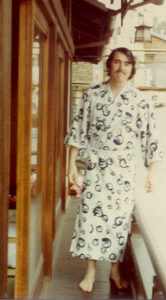
Mark Schilling, 1977
Mark’s parents said “warsh” instead of “wash.” They lived in Troy, Ohio, just north of Dayton. (This was North Midland dialect country.) Mark didn’t return to Troy after college. He wasn’t interested in becoming a J.C. Penney store manager like his dad. Mark went to L.A., then on to Japan. He’s still in Japan, 48 years later. Beat the drum for Mark Schilling, Bly.
Bly, you only spent a year — maybe two — in Norway! And then you wound up back in Minnesota and died there.
Check out the trailer for Mark’s movie Convenience Story, recently released.
August 30, 2023 3 Comments
I REMEMBER
I remember PSSC Physics. (Physical Science Study Committee.) Twelfth grade.
I remember Tarzana at the Roxy. I remember the trumpet player, too. He could play.
I remember “Java” by Al Hirt.
I remember Norm Cash. (I don’t know many names shorter than “Norm Cash.” There’s Joe Dart, the bass player in Vulfpeck, and the late Al Gray, a Cleveland philanthropist. How about Hy Fox? Who’s he?)
I remember the U.N. Flag Game. I remember the real estate board game Square Mile
I remember Special Hebrew — the boys-only weekday Hebrew class at Silver’s Temple.
I remember my Confirmation party at the Hospitality Inn in Willoughby. Why did my parents pick that place? Because it was close to where my dad worked and my parents got a deal on it.
I remember Hitler on German stamps.
I remember God — Rabbi Abba Hillel Silver.
I remember William E. Miller, Goldwater’s running mate.
I remember an Olds 98 with electric windows. (Belonged to a friend’s father.)
I remember the “collegiate” look: V-neck sweater — preferably cranberry — with Levi’s and penny loafers.
I remember Larry Zeidel, a Jew who played for the Cleveland Barons — an AHL hockey team.
I remember my dorm floor was called the “dope floor.” There were some heavy dopers on that floor. Most of them didn’t finish college. I remember a sign by the dorm elevator that read “Rap-in Tonight, Lounge, SDS.” The SDS recruiters wore wire-rims and work boots. The SDS-ers were excited about their fresh adventures at the Chicago Democratic Convention (1968).
I remember “Let’s split.”
I’m splitting.
July 11, 2023 2 Comments
(ALMOST) CONSTANT REJECTION
I wrote four novels in my 20s and 30s and had a topnotch agent. The agent handled Merle Miller, John Knowles, Garrison Keillor and me. I got rejected by high-quality publishing houses, like E.P. Dutton, Doubleday, Viking, Random House and Simon & Schuster. (How many of these publishing houses still exist?) I knew I’d get rejected a lot, but every three months for about 14 years? I developed the skin of a rhino.
My friend Harvey Pekar could kvetch. Then bingo, Dec. 31, 1979, The Village Voice ran a rave about Harvey’s comic books, and everybody suddenly liked Harvey’s stuff. Pekar walked to the post office almost daily to check his P.O. box for fan mail. He said, “Two or three of these [fan letters] a month keeps me going.”
Back to me . . . (Check out what I’ve written about Pekar here.) My final novel was about a Slovenian cop in Collinwood. I think Pekar would have appreciated. Not sure, because by then Pekar was married to his third wife, who didn’t let him hang around with his old friends. My novel had a weak plot. I wish I could do plots but I can’t. Whenever I hear “let me tell you a story,” I want to scram. Some rabbis like to tell stories. That’s their shtick: “Hey, here’s a parable.” Storytelling, that’s a buzzword. (Buzzword is a buzzword.)
A Viking editor wrote me: “You have a nice way with words, your dialogues are good, and your characters emerge as individuals.” That was probably my best rejection. My worst one was from my dad, who told me I was on “one big ego trip.” But my dad never abandoned me. He even wrote my literary agent to try to boost my stock. In 1973, when I was “on the road” in Latin America, my dad opened my mail in Cleveland and corresponded with my agent. He wrote her: “I have no quick way to contact Bert as he is traveling in Mexico.” My dad became my literary secretary.
Thirteen years later. 1986. My dad died fairly suddenly of leukemia and as soon as he was in the ground, I started searching for the letter he had written my agent. I looked through all my father’s paperwork, but his writings were mostly about toilets, radiators and insurance. He owned apartment buildings in Lakewood. He wrote, “Light incinerators from the top so they burn down . . . Thermocouples are our biggest problem. Kick in manually if necessary.”
I tried reaching the literary agent in New York; I wanted her to dig up the letter. But she was retired. A younger agent wrote back, “We were touched and wish we could produce your father’s letter but, alas, it is among the missing. The back files of the agency are at the Columbia University library. We thin our files from time and time, and I have to assume that your father’s letter fell victim to the thinning process.”
John Knowles visited my agent’s office twice a month to chat. My agent submitted A Separate Peace to 27 publishers before Macmillan picked it up in 1960. Why didn’t the agent get me 27 rejections-per-book? (Aside: My friend and op-ed writer Jimmy Sollisch says he’s going to write a piece about near misses. He says everybody has a good near-miss story. True.)
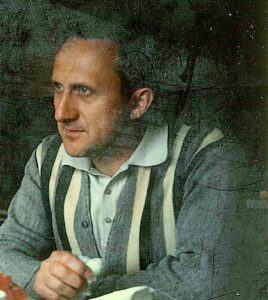
Toby Straton, 1967. Age 50
My dad urged me to get more involved in the family business, like point up some bricks, paint some walls, and get my hands dirty. He thought I should back off the typing and deal with real characters — plumbers, painters, bankers, insurance men.
I went into the real estate business, oh yeah. I stopped writing books and worked on a new long-term project — becoming worthy of the tombstone epitaph: “This guy didn’t screw up the family business.”
I found my dad’s correspondence with my agent a couple years ago. The letter was in the attic among some rejections. Here’s the letter . . .
“As Bert’s father, I’m sure you will understand my taking this opportunity, though I know Bert will shoot me the first chance he gets, to add that coupled with his talent he is a very dedicated, hard-working and disciplined writer. His heart, soul and efforts are all wrapped up in his work. And he started another book before he went off to Mexico to travel. On Bert’s behalf, I want to thank you for your encouraging letter, your interest in his book and everything you will do to try to get it published. Please do not hesitate to write me if I can be of further help during Bert’s absence. Thanks you so much and good luck.”
Is that an acceptance letter?
[This essay appeared, in slightly different form, in Belt Magazine in 2015. “My Acceptance Letter.”]
June 14, 2023 2 Comments
MY WORLD
I got a poem published in The World. The problem was my then-girlfriend, Nora, didn’t know what the The World was. Probably four people in all of Ann Arbor knew what The World was. It was a poetry magazine from the St. Mark’s Poetry Project, New York City. My poem was alongside poems by Peter Orlovsky, Ed Sanders, Frank O’Hara, Ted Berrigan.
Nora knew Ed Sanders from The Fugs, and I reminded her Orlovsky was Ginsberg’s boyfriend. Also, she knew about Berrigan because I talked about him so much. He had taught at Michigan three years earlier, and I’d taken his course.
Now, 1972, Berrigan passed through Ann Arbor again, and he gave me the news I was in The World. Berrigan was at the U. for a poetry reading (better, “to read poems”) in the Multipurpose Room at the UGLI (Undergraduate Library). After his reading, I asked Ted if he remembered me from 1969, and he said yes, and he said, “I see you’re in the latest World. Me and you both!” He pulled out a copy. I flipped.
Later I celebrated with Nora at Gino’s, a fast-food hamburger joint on North State Street. (Gino’s was founded by Gino Marchetti of the Baltimore Colts). At Gino’s, in walked Steve Rosen. He had been in Donald Hall’s creative writing class with me. “Hey, Rosen, I got in The World!”
Steve flipped. Steve knew the names of almost all the small lit mags in the country, and he’d sent out poems to some crazy places, like to Stevens College in Columbia, Missouri. Steve pointed out to Nora that I was now in the majors. Thank you, Steve.
Still, I didn’t have a copy of the mag. Berrigan had possibly the only copy of The World in the Midwest. Berrigan said he’d meet me after the poetry reading to go drinking. He would meet up with me and a handful of other Berrigan acolytes. The meet-up didn’t happen. Berrigan went off to Detroit, I think. I spent the evening calling a somewhat-random number and asking, “Is Ted Berrigan there?”
The World was on sale at New Morning Books, St. Mark’s Bookshop and Gotham Book Mart in New York City. The World wasn’t in the real world, but it was my world.
June 7, 2023 5 Comments
SHOULD I STAY IN CLEVELAND?
“You really want to stay here?” my friend Mark Schilling said. “Back to the womb? The Cuyahoga River as the umbilical cord. There are so many others ways to go, and why stay in a place that stinks in so many ways.”
“Yeah, well.”
“This place is a nuthouse, right? Admit it. Even if you do have all the comforts of home. Why kid yourself. You know the signs. You should fuck James A. Rhodes and all the assholes who voted for him. Christ, you wait any longer, you’ll be left with just Hal Lebovitz’s sports columns and Mom’s pastrami sandwiches.”
“Yeah, well.”
“Kerouac, Buk and all the other guys aren’t great because they sat on their asses and made a lot of neat excuses. They’ve done it; begged for pennies in the street, licked spit off the floor. All that good shit. They’ve done it. The whole fucking tour. What have you done? You can’t sit on your ass in the library and expect salvation. I’m just saying.”
[circa 1972.]
May 23, 2023 1 Comment
BEANS
I was staying at a Yucatecan restaurant called Zazil Ha. I didn’t know what “Zazil Ha” meant. (It’s the name of a 16th-century Mayan princess.) I was staying there a while, not just for dinner. I lived above the restaurant for six weeks, eating beans, beans, and more beans. I was 18. I didn’t really like beans. I didn’t like Mexican food, period. I went to KFC on occasion and lived off oatmeal and Pan Bimbo. Mexico City, 1968, the summer after I graduated high school.
I missed the shootings at the national university, and I missed the Olympics. But I caught Pan Bimbo, which is white bread. I lived with three college boys from Wisconsin and Minnesota who called me “a stop,” which meant I supposedly stopped them from getting laid.
I took a course, History of Mexico, at the Universidad Ibero-Americana. I got a couple credit hours at Michigan for that.
I still like KFC. I haven’t had any lately, but when I’m in hospice care I want some KFC. (And I like Mexican food now.)
February 15, 2023 4 Comments
MEANINGFUL WORK
“Meaningful work” was a popular phrase when I graduated college in 1973. I first heard it from Lawrence Kasdan, the Big Chill director. (I didn’t know Kasdan. I read an interview with him.) I tried being a bricklayer. A “brickie.” I got a joiner, mortar and mason’s trowel. I knew another Jewish bricklayer, who talked up the profession. My father said, “You want to work with your hands?”
Just a thought, Dad. A passing thought. I learned a bit about roofs, radiators and hot water tanks. Whenever my father had tools in his hand — which was rare — he was often loud and profane. I know a couple Jewish car mechanics and Jewish fix-it guys. It’s all about how you were raised. My dad gave me arithmetic workbooks in elementary school. For fun I plotted graphs. In high school I got fast on the abacus.
If you want a number, see me. Here are a couple: the rent on apt. 7 at 1407 Marlowe Avenue was $60 in 1965. In 2009 the rent was $470. In 2022 it’s $670. [Rent is going up slightly faster than inflation in Cleveland (Lakewood). Sixty dollars in 1965 equals $568 in today’s dollars.]
—
I had an essay in City Journal last week. “Adventures in Tenant Vetting.” It’s amusing.
December 14, 2022 1 Comment
CANADA IS BETTER THAN
THE UNITED STATES
My friend Jeff didn’t like Cleveland. He didn’t like tumult: the horns honking, boom boxes, loudmouths, leaf blowers, his parents pestering him. He just couldn’t take it.
I subscribed to Hockey Night in Canada on cable TV for Jeff, so he would babysit my kids for free. Every Saturday night. He liked Canada — really liked Canada. He filled out immigration papers, waited months for clearance, got a job, and moved to a small town in Ontario. He came home the next day. He said he didn’t like the job in Canada, but he liked the Canucks. “They don’t give you the finger,” he said.
Then he moved to Canada again. This time to Nova Scotia. That worked. Change your place, change your luck.
I haven’t seen Jeff in 28 years. I miss his acerbic slant on life. For a social worker, he was a total misanthrope and blisteringly funny. “Life is With People” was not Jeff’s M.O. He liked to eat Mrs. Paul’s fish sticks alone. He criticized me for going to restaurants too often. He claimed I was on a fruitless existential search for exotic experiences – for foods my bubbe and mother never made. He claimed I would “eat flanken cooked directly off the seat cover of a crosstown bus.”
We listened to Bob and Ray records, played music, and made fun of other Jews. Jeff knew some Yiddish — more than me. His favorite expression was Gey mit dayn kup in drerd. (Go to hell. lit: go with your head in the ground).
I had to drive Jeff everywhere. Lazy guy, and he had a car. I would schlep him to the Near West Side to hillbilly bars so he could jam with bands. He would play “Two More Bottles of Wine “and “Jambalaya.” That was real; it wasn’t Jewish. His favorite records were Nashville Skyline and anything by Hank Williams. Jeff sang only once on the East Side, at a cancer fundraiser at Heinen’s supermarket. He played “Good Old Mountain Dew” by the soda pops and “Oh Canada” by Canada Dry.
—
Here’s an essay I had in the Cleveland Plain Dealer last week (Nov. 30). There’s a paywall at the Plain Dealer. Here’s the whole article . . .
WHO’S YOUR FAVORITE BAND?
by Bert Stratton
CLEVELAND HEIGHTS, Ohio — I occasionally run into young people who lament they didn’t live through the hippie era. They will even listen to my hitchhiking stories. Nobody else will. I tell these young people that the big question in the late ‘60s and early ‘70s was, “Who’s your favorite band?”
The more obscure the band, the better.
Some astute choices were The Stooges, the Flying Burrito Brothers, and Commander Cody and His Lost Planet Airmen. More mainstream, but still acceptable, was Frank Zappa’s Mothers of Invention. Too mainstream: Bob Dylan, Jefferson Airplane and Joni Mitchell.
My favorite musician was Fred Neil, a Greenwich Village singer/songwriter. He wrote “Everybody’s Talkin’,” the theme song from the movie “Midnight Cowboy.” Harry Nilsson sang the movie track and made it popular.
Fred Neil was never popular. Good — for me. I sold my Fred Neil records a few years ago. Pete Gulyas, the owner of Blues Arrow Records in Collinwood, said my Neil recordings were worth more than all my Beatles and Dylan records combined. When Pete looked through my records, we found a receipt — $1.50 from Mole’s record store. Where was Mole’s? (It was on Coventry Road in Cleveland Heights.)
Comic-book writer Harvey Pekar used to rifle through my albums. Talk about a record snob – Pekar. The only album he ever wanted was my “Charlie Parker Memorial Album,” Vogue Records, England, 1956. I didn’t sell it to Harvey. I figured if Pekar wanted the record that badly, it must be worth something.
Pete the Record Guy looked through my albums three times, and I bid adieu to “Aretha Live at the Fillmore West,” Herbie Mann’s “Memphis Underground,” and “The Paul Butterfield Blues Band” ….
Who’s your favorite band now — in 2022? Are you even allowed to have a favorite band? Yes, you are, and you are encouraged to.
Every year in early December, the music-streaming service Spotify spews out data to its 456 million users, itemizing each listener’s most-played tunes of the past year. This annual reckoning is called Spotify Wrapped. Many fans share their Spotify Wrapped profile online; it’s the equivalent of showing off one’s record collection, circa 1970. Your Spotify Wrapped is your cultural ID badge.
I expect my Spotify Wrapped 2022 will feature Joni Mitchell, Leonard Cohen and some newer acts, like Vulfpeck and the Fearless Flyers. (My son Jack is in Vulfpeck. He schools me on post-1975 music.) Songs older than 18 months represent 70% of the U.S. streaming music market, according to MRC Data, a music-analytics firm.
I rinse my dinner dishes to Joni Mitchell and often add Paul Butterfield for pot-scrubbing. Klezmer music is good for putting away leftovers. I’m not only Spotify Wrapped, I’m Saran wrapped.
I hitchhiked from Los Angeles to Chicago in 36 hours in 1973. That was a land-speed record for hitching, I think. The big hit on the radio then was, “Tie a Yellow Ribbon Round the Ole Oak Tree.” I learned to drive a stick shift, jerkily. The car owner was a Marine from Camp Pendleton, California, on his way to visit his girlfriend in Chicago. At nearly every rest stop, the Marine threatened to trade me in for a more seasoned stick-shift driver. But we made it to Chicago. Tony Orlando and Dawn are not on my Spotify Wrapped.
Who’s on yours?
Bert Stratton lives in Cleveland Heights and is the leader of the band Yiddishe Cup. He writes the blog “Klezmer Guy: Real Music and Real Estate.”
December 7, 2022 11 Comments
JEWISH MUSIC
AND JEWISH SPORTS
When I was growing up, “Jewish music” was like saying “Jewish cars.” It didn’t mean anything.
On second thought, “Jewish cars” did mean something. It meant “The Boat” — an Olds 98 owned by the father of a high school friend, Mark. The Boat had electric windows and was oceanic. Mark was richer than the rest of us, I think. His house had a doorbell that lit up.
“Jewish music” . . . I learned about that at the house of another high school friend, Shelly Gordon. His parents knew a lot about Israeli and Yiddish music. Shelly’s parents were Labor Zionists (Poale Zion). They seemed to know every classic Israeli tune and how to dance and sing it. The family attended a Yiddish camp, Farband, in Michigan. (Clarification, in high school I didn’t hang out much at Shelly’s house. When I was in my 30s, I went to his house a lot to learn about Jewish music.)
Shelly’s parents didn’t “know from sports.” That was strange because Shelly wound up a star athlete. He played tennis for Ohio State and eventually became a tennis pro in Israel. He never took a private tennis lesson but he gave a lot of private lessons.
Shelly didn’t care about Jewish music. He cared about the Cleveland Browns, Ohio State Buckeyes and Cleveland Indians. In Israel he logged on at about 3 a.m. to catch Cleveland sports scores. He had a yarmulke that read “Cleveland Cavaliers.”
Shelly’s dad, Sanford, knew all the Israeli tunes and never played sports. In fact Mr. Gordon was so oblivious to sports he didn’t even sign Shelly up for Little League. Mr. Gordon was not an immigrant or DP either; he was a NASA scientist and full-blown Zionist. Baseball meant nothing to Israelis, so it meant nothing to Mr. Gordon. Shelly went to a Zionist camp, Habonim, in Michigan.
Shelly has been a tennis pro in Jerusalem for decades. He still doesn’t know much Jewish music. (Come on, he must!)
November 9, 2022 1 Comment
THE SPEED READER
I went to a speed-reading workshop at the Somerset Inn. Somebody there was pitching the Evelyn Wood method. No thanks. Too expensive.
DIY was my style. I got on a self-improvement kick. I was 23, living with my parents, and I sped-read Exodus and Herzog and all the other blue classics lying around my parents’ apartment.
I could even speed-read stop signs. You see STOP, but you don’t subvocalize it. You let the world imprint itself on your brain. It’s hard to speed-read longer signs, like “Brainard-Cedar, Next Right.”
I wish I could read faster but I can’t.
September 7, 2022 1 Comment
BOUNCE CITY
When a rent check bounces, the bank charges me a fee. I didn’t bounce the check. Am I supposed to ask the tenant beforehand, “Is your check good or is it tissue paper?”
Eve, a tenant, ran a beauty parlor and was a chronic check-bouncer. She screamed at me: “My freaking check is good! Why don’t you put it in! I hand-delivered it to the manager yesterday.”
“The bank charges me!” I said. “I just called the bank. The teller said it was no good.”
Eve was at the bank. The check was good now, she claimed. And I had just gone to city hall and filed an eviction on her for $100.
I said, “OK, I’ll put the check in if it’s good.”
“The check is good!” she said. “I pay my rent and I intend to pay it until the end of my lease, at which point I’m out of here. And you haven’t fixed the back screen door.”
I said, “I’m evil, I know that. You don’t like me, and I don’t like you.” I hung up and called the bank. The check was good.
Peace and love.
—
Yiddishe Cup plays a free outdoor concert tomorrow (6:30-8:30 pm Thurs., June 9) at the Cedar-Fairmount, Cleveland Heights. The show is in a secret location — the parking lot in back of Firestone, 12420 Cedar Rd. (The parking lot’s entrance is on Grandview Road.) Bring a chair.
June 8, 2022 3 Comments
UNHINGED
Henry Polatsek, an elderly man in my neighborhood, gave me postage stamps. My first stamp was the 4-cent Wisconsin Worker’s Compensation (1961). Mr. Polatsek also periodically visited my elementary school and passed out stamps to all the kids. He once took me to a stamp show at the Manger Hotel. The show was just old guys and me.
I ran into Mr. Polatsek years later — when I was in my 20s — and asked him about his collection. He said it had been stolen. “Now I only collect pictures of my grandchildren,” he said.
My mother sent stamps to me when I went off to college. I told her to stop. She sent me W.C. Handy (1968) and Leif Erikson (1968). It was embarrassing — a hip college kid getting collectibles from his mom.
I gave up stamp collecting. Still, I like the idea of stamps, and I use them.
Alfred F. Stern. He was a stamp dealer on Superior Road, Cleveland Heights. I went to his apartment. He had all the American stamps, plus Israeli, U.N. and new countries. I got the first stamps from Malaysia. I still have a U.N. souvenir sheet. I got it for my Confirmation.
The U.N. and Israeli stamp markets crashed. I should use my 4-cent stamps for postage. I had a tenant who plastered her rent envelopes with low-denomination stamps. She was old and apparently a former stamp collector.
—
Yiddishe Cup plays a free outdoor concert next week — 6:30-8:30 pm Thurs., June 9. It’s in the parking lot in back of Firestone, 12420 Cedar Rd., Cleveland Heights. Bring a chair.
June 1, 2022 1 Comment
A WALKER IN THE CITY
Roll it . . . I buy a slice of pizza on Broadway and walk by the Cooper Union, then down St. Mark’s Place. I notice the Fillmore East is going to reopen as a circus. I go up Second Avenue and see bus ads that say Prisoner of Second Avenue on them. That’s a Neil Simon play. (When Simon was on Dick Cavett, Simon said his problem was he couldn’t stop writing.)
I arrive at 215 Second Avenue, my destination. I’m thinking of renting a room here, but the sublet guy isn’t home. A friend of his is in. He’s Joel. Another guy is here, too. He’s Joe. The guy I’m looking for is Joey. The place is a dump. All these guys are crashing here. Joel has a hacking cough and a pornographer’s beard. The windows are dirty and have iron gratings. I’ll take the place.
I use Spic and Span to clean the refrigerator and kitchen table. Joel says, “Don’t be so middle-class about it.” Joel is a graduate of Queens College, as are Joe and Joey. Joel spits blood in the toilet and doesn’t flush it. He floats his pink toilet paper! The cat shit is encrusted all over the bathroom. Joe is the editor of Monster Times.
I head over to Greenwich Village. I know a recent Brandeis graduate there who has enrolled in NYU law school. He lives on Waverly Place and is seemingly normal. He’s not in. I go to Fifth Avenue and look up a girl whose father I know from Cleveland. The doorman says I can buzz her. “I’m Bert,” I say on the intercom.
“Who?”
“Bert like in Bert Parks.”
This girl is a buyer for Bloomingdale’s. She’s heading out to New Jersey for a grand opening. I head over to the 34th Street YMCA, where I’ll spend the night, I think. A girl there — at the Y — asks me, “Where are you from?”
“Michigan.” (Michigan is cooler than Ohio.)
“I’m from Minnesota!” she says. She says she’s going to be an actress. Her boyfriend shows up.
Walkin’.
April 13, 2022 3 Comments
WITH THE RED CAVALRY, CLEVELAND
Most every Jewish baby boomer in Cleveland grew up around Holocaust survivors, unless he lived in Shaker Heights, and even in Shaker there were probably a few DPs in the double houses.
I had a classmate at Brush High who retold his parents’ Nazi horrors to the local newspaper in the 1960s — pre-Holocaust (before the word Holocaust went big-time). Joe was a super Jew. Joe’s father worked at a kosher poultry market. Joe often stayed home for obscure (to me) Jewish holidays. Some of the Jewish kids teased him when he came back. (The goys didn’t notice.)
I copied Joe’s style. I wrote a letter to the Cleveland Press protesting the U.S. Christmas stamp, which had a religious symbol (Madonna and child), 1966. I said the new stamp violated the separation of church and state. I got letters back. One reader wrote, “Go to Vietnam where men are men and not homosexual like you.” That got me to write more letters. I wrote about Poland expelling its last Jews in 1968. I vied with Joe for champion of Jewish teenage letter writers. All I had to do was write Jew, and I would get half-baked, vitriolic feedback. I enjoyed that. I had been through so little. I wanted to experience World War II. Then I’d go home and eat some Jell-O.
—
Alex Kozak sold record albums and sewing machines. Appliance store owners used to sell records; I got Bechet of New Orleans and Be Bop Era (RCA Vintage Series) from Mr. Kozak. He was a World War II 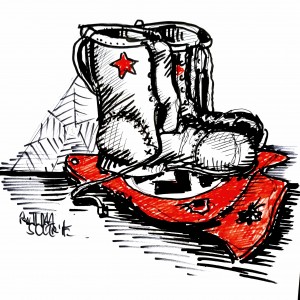 Red Army veteran — a Hungarian Jew who escaped the Nazis and fought with the Russians. I borrowed his cavalry boots for my high school Canterbury Tales presentation. Mr. Kozak was big — about one-and-a-half Isaac Babels.
Red Army veteran — a Hungarian Jew who escaped the Nazis and fought with the Russians. I borrowed his cavalry boots for my high school Canterbury Tales presentation. Mr. Kozak was big — about one-and-a-half Isaac Babels.
I knew Mr. Kozak through my parents, who often socialized with Holocaust survivors. My dad liked the men; many were into baseball and were for the most part no-nonsense. What was there to talk about — the good old days? Keep it short. My dad liked that.
At a Yiddishe Cup gig in Detroit, I ran into Mr. Kozak’s daughter. She said her nephew had the cavalry boots now — the ones Mr. Kozak had worn into Prague with the Soviets in 1945.
Lime Jell-O. That was the best.
—
“Joe” is a pseudonym, re: my high school friend.
February 16, 2022 5 Comments




